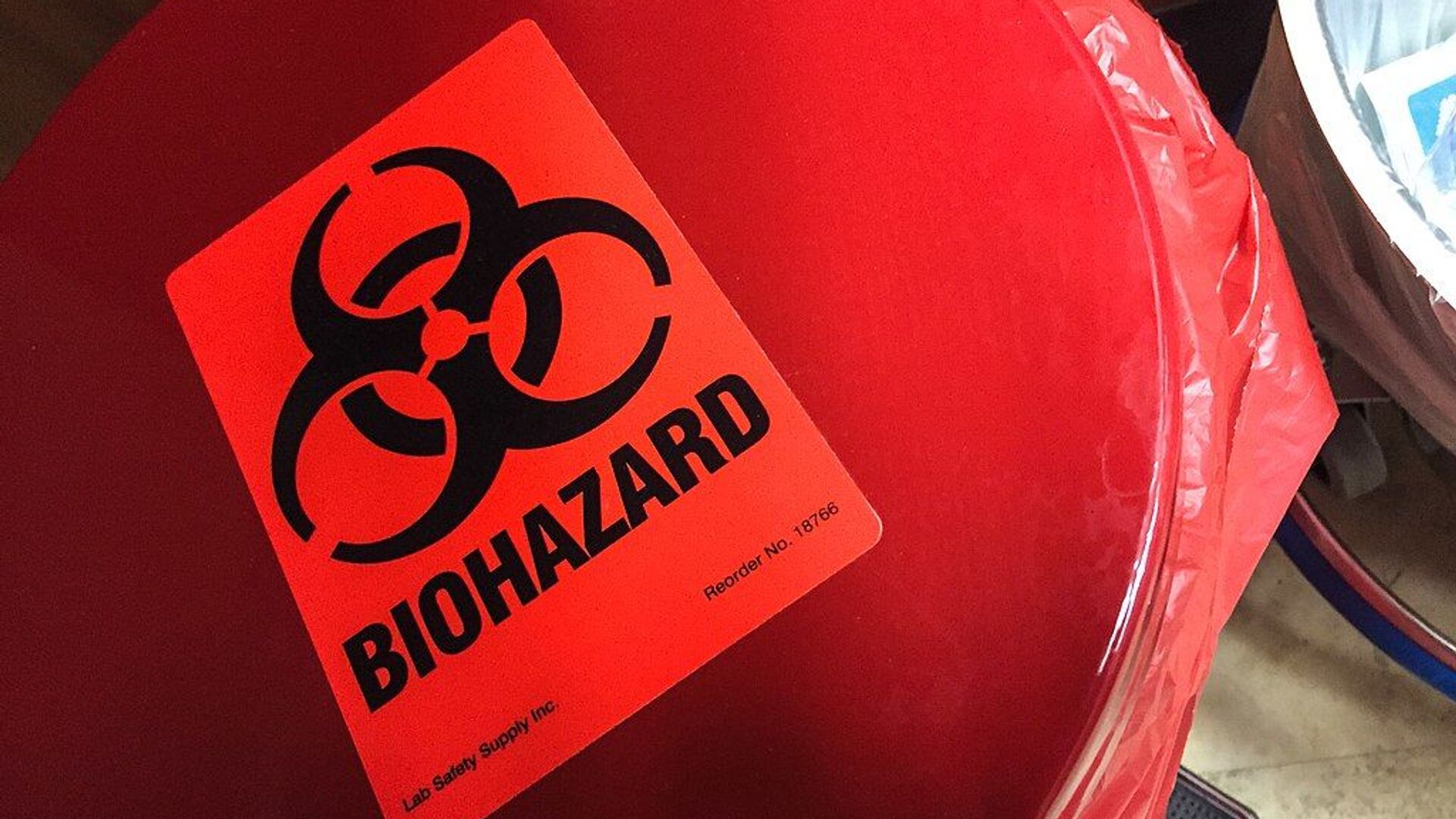Who Are the Americans Coordinating Bioweapons Research in Ukraine Labs?
19:47 GMT 31.03.2022 (Updated: 19:49 GMT 31.03.2022)
Subscribe
Amid its ongoing special operation in Ukraine, Russian forces discovered US-operated biolabs in the country carrying out dangerous pathogen research. While Washington initially tried to deny their existence, they later confirmed it, but claimed the labs’ activities were unremarkable.
The Russian Ministry of Defense (MoD) revealed new documents on Thursday that had been seized by Russian forces in eastern Ukraine, including correspondences between American financier Hunter Biden - the son of US President Joe Biden - and figures involved in biological research in Ukraine, which an investment firm of his helped to bankroll.
The documents revealed an intent to create a "Central Depository of Especially Dangerous Microorganisms in Kiev," according to Russian MoD spokesperson Maj. Gen. Igor Konashenkov, as well as ways to distribute biological agents via drone.
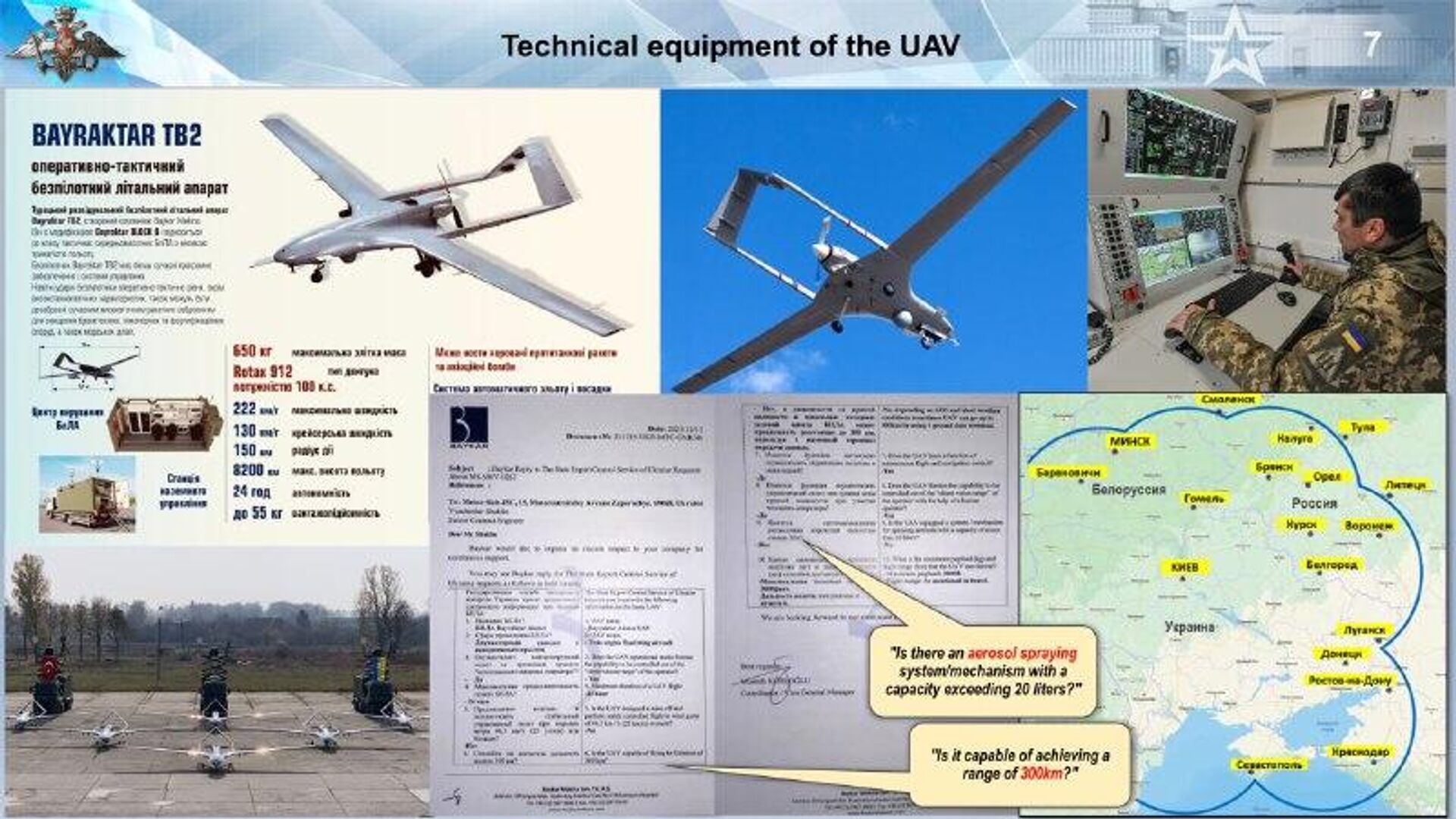
Russia's MoD releases info on US involvement in Ukraine's bioweapons research
© Photo : Russian Ministry of Defence
The emails revealed the names of several American figures central to the biological research projects from the firms Metabiota and Black & Veatch, as well as officials from the US Defense Threat Reduction Agency (DTRA). Those named include:
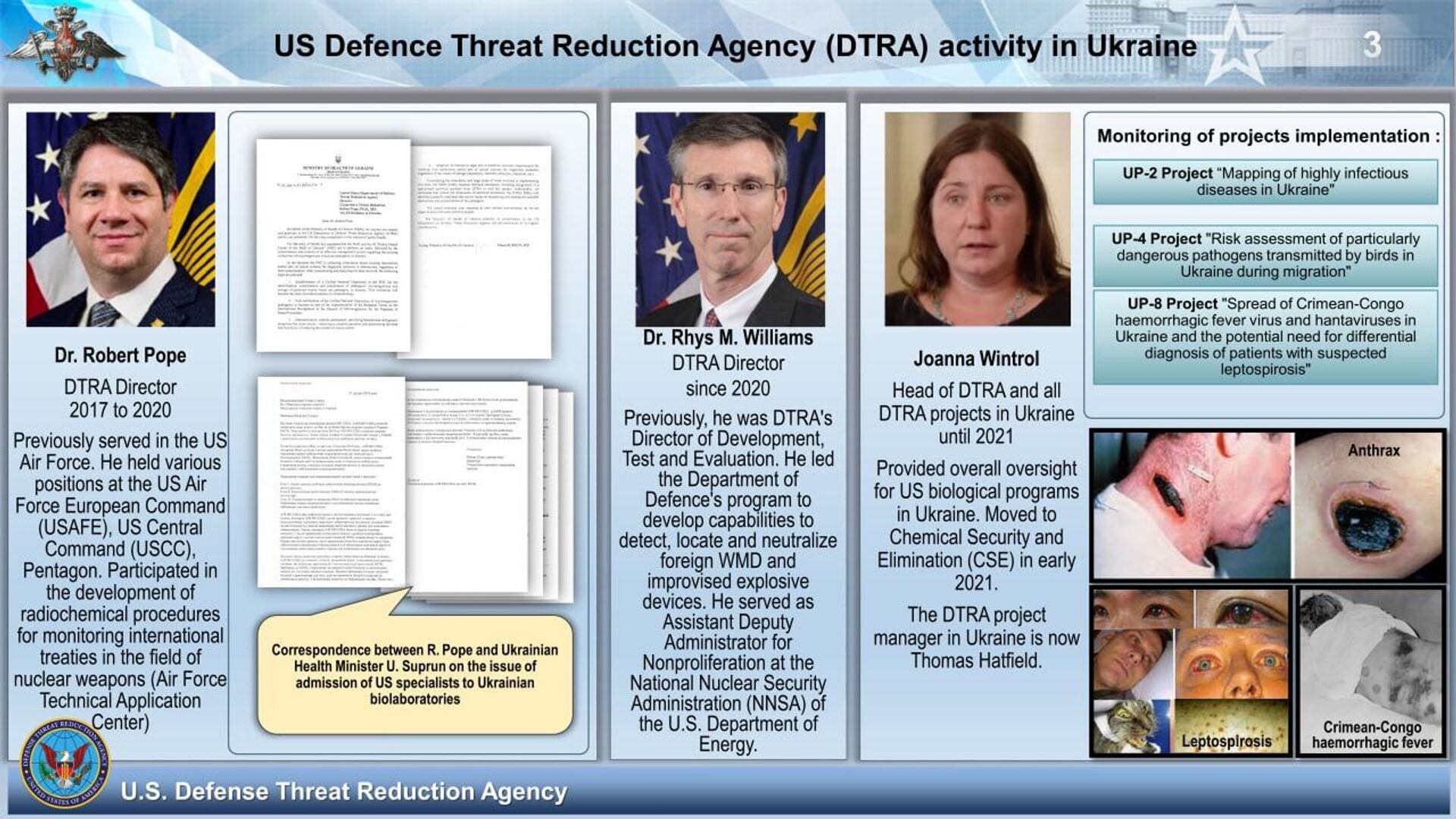
Russia's MoD releases info on US involvement in Ukraine's bioweapons research
© Photo : Russian Ministry of Defence
Robert Pope
Pope was deputy director of operations, readiness and exercises at the DTRA from 2017 until 2020. He previously held various positions at US Air Force European Command (USAFE), US Central Command (USCC), and the Pentagon. Pope participated in the development of radiochemical procedures for monitoring international treaties in the field of nuclear weapons (Air Force Technical Application Center).
The published emails revealed a correspondence between Pope and Ukraine’s acting health minister between 2016 and 2019, American-born Ulana Suprun, who went to Ukraine to participate in the US-backed coup in 2014.
Rhys M. Williams
Williams took over for Pope as acting DTRA director in 2020, having previously been the agency’s director of development, test and evaluation. He led the Department of Defense’s program to develop capabilities to detect, locate and neutralize foreign WMD and improvised explosive devices. Williams also served as Assistant Deputy Administrator for Nonproliferation at the National Nuclear Security Administration (NNSA) of the US Department of Energy, the organization responsible for the country’s nuclear weapons arsenal.
Joanna Wintrol
Wintrol headed DTRA projects in Ukraine until 2021 at the US Embassy in Kiev’s Defense Threat Reduction Office.
Emails published by the MoD revealed she directly supervised experiments with deadly pathogens, including the UP-2 Project for “mapping highly infectious diseases in Ukraine,” including anthrax; the UP-4 Project, described as a “risk assessment of particularly dangerous pathogens transmitted by birds in Ukraine during migration”; the UP-8 Project studying “spread of Crimean-Congo hemorrhagic fever virus and hantaviruses in Ukraine and the potential need for differential diagnosis of patients with suspected leptospirosis. Previously released documents showed she also oversaw Project P-782, conducting research into the transmission of diseases through bats.
Wintrol moved to Chemical Security and Elimination (CSE) in early 2021. According to a DTRA publication, CSE was formerly known as the Chemical Weapons Elimination (CWE) program and the Chemical Weapons Destruction (CWD) program. The effort “started in 1992 to build the capacity of the states of the Former Soviet Union (FSU) to reduce the threat from chemical weapons (CW) by securing and eliminating CW stockpiles, chemical research capabilities, and production facilities, while also redirecting scientists to peaceful purposes,” the agency said.
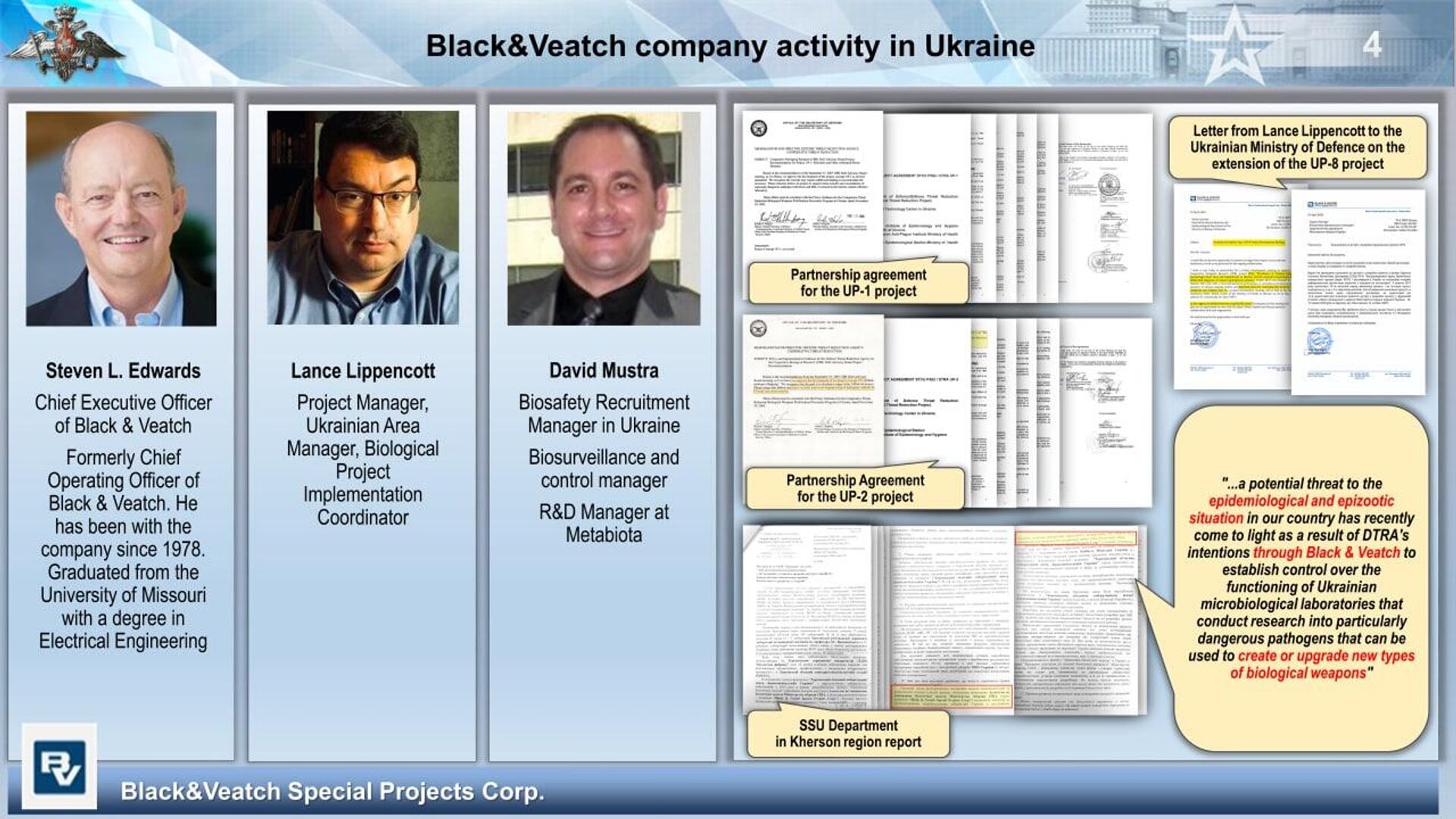
Russia's MoD releases info on US involvement in Ukraine's bioweapons research
© Photo : Russian Ministry of Defence
Steven L. Edwards
Since 2013, Edwards has been the CEO of American engineering firm Black & Veatch, a longtime contractor for the Pentagon used for a variety of construction tasks. He has been with the company since 1978 and was formerly its Chief Operating Officer.
Black & Veatch was long known to be working on Pentagon projects in Ukraine, but the documents seized by Russian forces earlier this month revealed the firm’s job in overseeing biological programs there, including the UP-8 project previously mentioned, studying Crimean-Congo hemorrhagic fever, leptospirosis and hantaviruses.
Lance Lippencott
He has been the project manager in Ukraine for Black & Veatch since 2011 and its biological project coordinator. In August 2021, he told the Kansas City Business Journal that his work on airborne biological agents in Ukraine had helped Black & Veatch to develop a device for purifying air of SARS-CoV-2 virus particles, the virus that causes COVID-19. Lippencott is a graduate of the US Army Military Academy at West Point.
In one of the documents published by the MoD, a report from the Security Service of Ukraine’s Kherson region referred to “a potential threat to the epidemiological and epizootic situation in our country that has recently come to light as a result of DTRA’s intentions through Black & Veatch to establish control over the functioning of Ukrainian microbiological laboratories that conduct research into particularly dangerous pathogens that can be used to create or upgrade new types of biological weapons.”
Another document from Lippencott to the Ukrainian Ministry of Defense concerns the extension of the UP-8 project mentioned above.
David Mustra
"Issues of biomonitoring and transfer of information were supervised by David Mustra, who is closely associated with another Pentagon contractor, Metabiota,” Konashenkov said. “Previously, he led military bio-projects in Ukraine and Eastern Europe as part of the Cooperative Threat Reduction Program.”
Mustra was the company’s biosafety recruitment manager in Ukraine, its biosurveillance and control managers, and the head of Metabiota’s research and development.
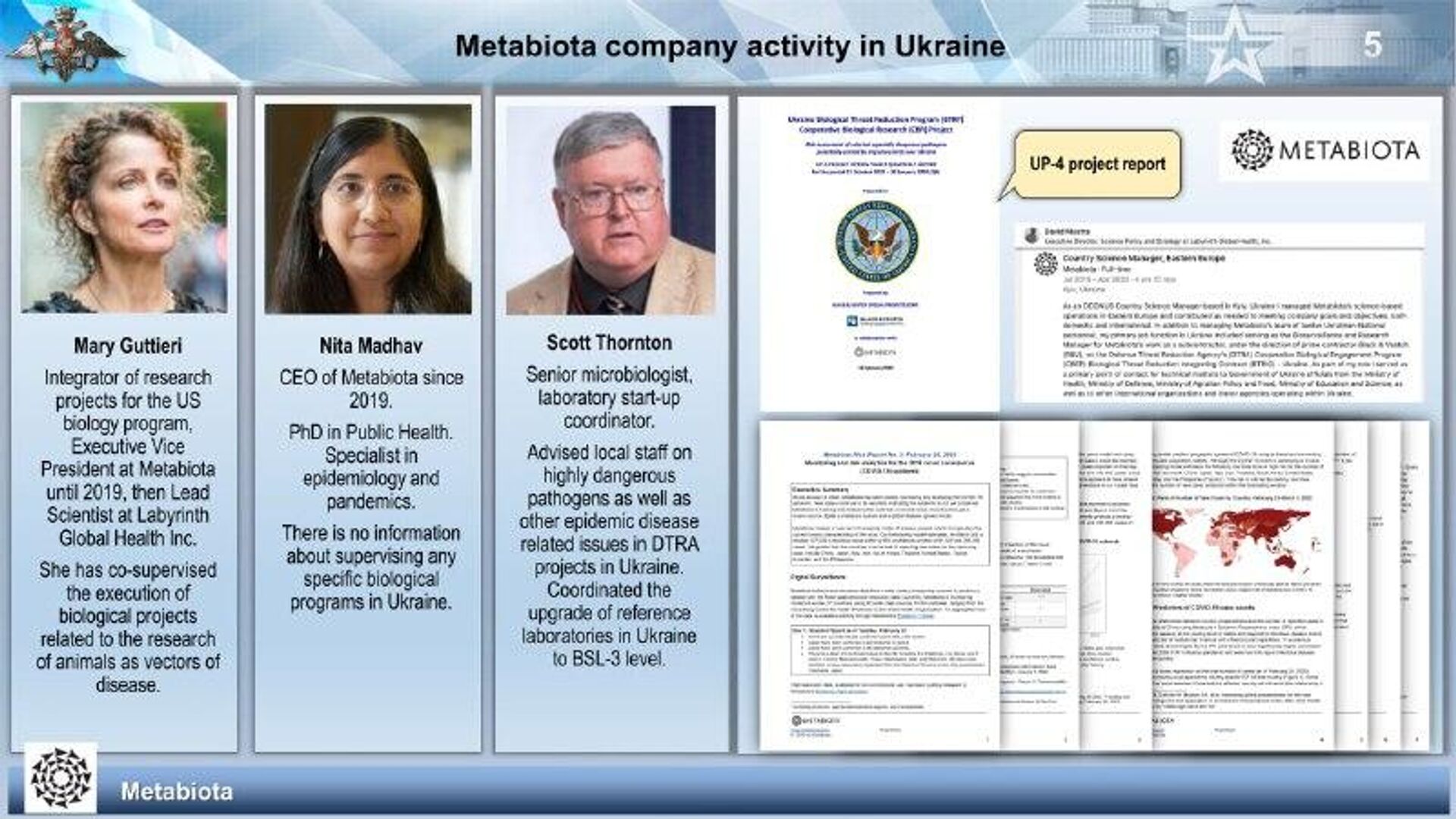
Russia's MoD releases info on US involvement in Ukraine's bioweapons research
© Photo : Russian Ministry of Defence
Mary Guttieri
With a doctorate in microbiology from UMass Amherst, Guttieri was the Executive Vice President at Metabiota from 2014 until 2019, and was previously the vice president of its Science & Technology Administration. She is now the lead scientist at Labyrinth Global Health.
In Ukraine, Guttieri was the integrator of research projects for the US biology program and supervised the execution of biological projects related to the research of animals as vectors of disease.
Nita Madhav
Madhav has been the CEO of Metabiota since 2019. She specializes in epidemiology and pandemics and has a PhD in Public Health. However, according to the Russian MoD, there was no information in the documents about her supervising any specific biological programs in Ukraine.
Scott Thornton
Thorton was Metabiota’s senior microbiologist and laboratory start-up coordinator between 2006 and 2016. He previously spent 20 years in the US Navy, where he worked as a research microbiologist and head of the Navy’s Threat Assessment Department. According to his CV, Thornton did his work at secret facilities, including one in Cairo, Egypt, and “conducted research on disease agents of military relevance, especially enteric pathogens.”
In Ukraine, Thornton advised local staff on highly dangerous pathogens as well as other epidemic disease related issues in DTRA projects, and coordinated the upgrade of reference laboratories in Ukraine to biosafety level 3 (BSL-3), which are used to study infectious agents or toxins that may be transmitted through the air and cause potentially lethal infections.
